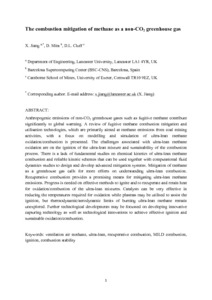Mostra el registre d'ítem simple
The combustion mitigation of methane as a non-CO2 greenhouse gas
| dc.contributor.author | Jian, X. |
| dc.contributor.author | Mira Martínez, Daniel |
| dc.contributor.author | Cluff, D.L. |
| dc.contributor.other | Barcelona Supercomputing Center |
| dc.date.accessioned | 2018-04-05T09:20:00Z |
| dc.date.available | 2020-05-01T00:25:48Z |
| dc.date.issued | 2018-05 |
| dc.identifier.citation | Jian, X.; Mira, D.; Cluff, D.L. The combustion mitigation of methane as a non-CO2 greenhouse gas. "Progress in Energy and Combustion Science", Maig 2018, vol. 66, p. 176-199. |
| dc.identifier.issn | 0360-1285 |
| dc.identifier.uri | http://hdl.handle.net/2117/115968 |
| dc.description.abstract | Anthropogenic emissions of non-CO2 greenhouse gases such as fugitive methane contribute significantly to global warming. A review of fugitive methane combustion mitigation and utilisation technologies, which are primarily aimed at methane emissions from coal mining activities, with a focus on modelling and simulation of ultra-lean methane oxidation/combustion is presented. The challenges associated with ultra-lean methane oxidation are on the ignition of the ultra-lean mixture and sustainability of the combustion process. There is a lack of fundamental studies on chemical kinetics of ultra-lean methane combustion and reliable kinetic schemes that can be used together with computational fluid dynamics studies to design and develop advanced mitigation systems. Mitigation of methane as a greenhouse gas calls for more efforts on understanding ultra-lean combustion. Recuperative combustion provides a promising means for mitigating ultra-lean methane emissions. Progress is needed on effective methods to ignite and to recuperate and retain heat for oxidation/combustion of the ultra-lean mixtures. Catalysts can be very effective in reducing the temperatures required for oxidation while plasmas may be utilised to assist the ignition, but thermodynamic/aerodynamic limits of burning ultra-lean methane remain unexplored. Further technological developments may be focussed on developing innovative capturing technology as well as technological innovations to achieve effective ignition and sustainable oxidation/combustion. |
| dc.description.sponsorship | We would like to thank the reviewers and the editor for their constructive suggestions on the manuscript. These research results have received funding from the EU H2020 Programme (No. 689772) and from MCTI/RNP-Brazil under the HPC4E Project, grant agree- ment no 689772. |
| dc.format.extent | 24 p. |
| dc.language.iso | eng |
| dc.publisher | Elsevier |
| dc.subject | Àrees temàtiques de la UPC::Energies |
| dc.subject.lcsh | Methane--Environmental aspects |
| dc.subject.lcsh | Carbon dioxide as a calibration gas |
| dc.subject.other | Ventilation air methane |
| dc.subject.other | Ultra-lean |
| dc.subject.other | Recuperative combustion |
| dc.subject.other | MILD combustion |
| dc.subject.other | Ignition |
| dc.subject.other | Combustion stability |
| dc.title | The combustion mitigation of methane as a non-CO2 greenhouse gas |
| dc.type | Article |
| dc.subject.lemac | Metanol |
| dc.subject.lemac | Anhídrid carbònic |
| dc.identifier.doi | 10.1016/j.pecs.2016.06.002 |
| dc.description.peerreviewed | Peer Reviewed |
| dc.relation.publisherversion | https://www.sciencedirect.com/science/article/pii/S0360128515300605 |
| dc.rights.access | Open Access |
| dc.description.version | Postprint (author's final draft) |
| dc.relation.projectid | info:eu-repo/grantAgreement/EC/H2020/689772/EU/HPC for Energy/HPC4E |
| local.citation.publicationName | Progress in Energy and Combustion Science |
| local.citation.volume | 66 |
| local.citation.startingPage | 176 |
| local.citation.endingPage | 199 |
Fitxers d'aquest items
Aquest ítem apareix a les col·leccions següents
-
Articles de revista [273]


